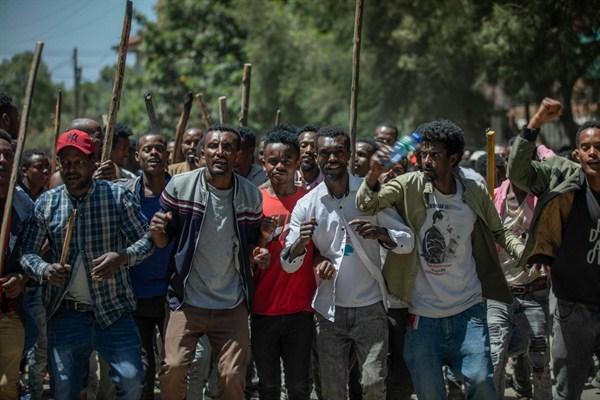Scores of people died in Ethiopia in late October after anti-government demonstrations descended into communal violence in and around the capital, Addis Ababa, and other parts of the Oromia region. The protests against Prime Minister Abiy Ahmed began when a high-profile activist and media mogul, Jawar Mohammed, accused the government of plotting an attack on him at his home.
Responding to the violence—which killed 86 people, according to the government’s latest count—is only one of the domestic challenges facing Abiy, who was awarded the Nobel Peace Prize last month for his efforts to reconcile with neighboring Eritrea. To discuss the situation in Ethiopia, WPR’s Elliot Waldman is joined by Terrence Lyons, an associate professor at the School of Conflict Analysis and Resolution at George Mason University, where his research focuses on comparative peace processes and post-conflict politics in Africa.
If you like what you hear on Trend Lines and what you’ve read on WPR, you can sign up for our free newsletter to get our uncompromising analysis delivered straight to your inbox. The newsletter offers a free preview article every day of the week, plus three more complimentary articles in our weekly roundup every Friday. Sign up here. Then subscribe.
Listen:
Download: MP3
Subscribe: iTunes | RSS | Spotify
Relevant Articles on WPR:
Could the Fallout From Ethiopia’s Failed Coup Derail Abiy’s Reform Agenda?
Amid Revolutionary Change at Home, Ethiopia Is Remaking Its Middle East Ties
In a Bold Experiment, Ethiopia’s Abiy Aims to Put Citizenship Over Ethnicity
Can ‘Abiymania’ in Ethiopia Withstand the Threat of Ethnic Conflict?
Trend Lines is produced and edited by Peter Dörrie, a freelance journalist and analyst focusing on security and resource politics in Africa. You can follow him on Twitter at @peterdoerrie.
To send feedback or questions, email us at podcast@worldpoliticsreview.com.

